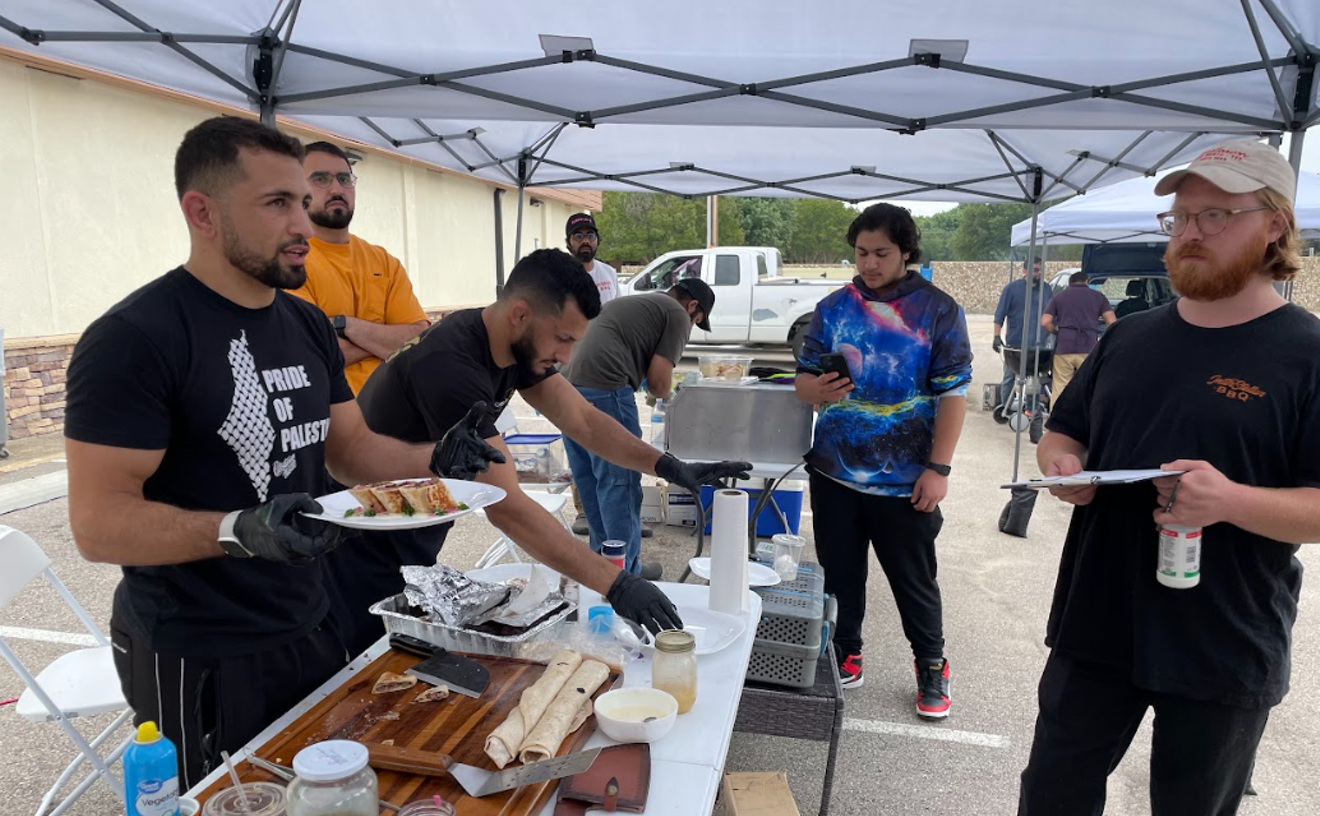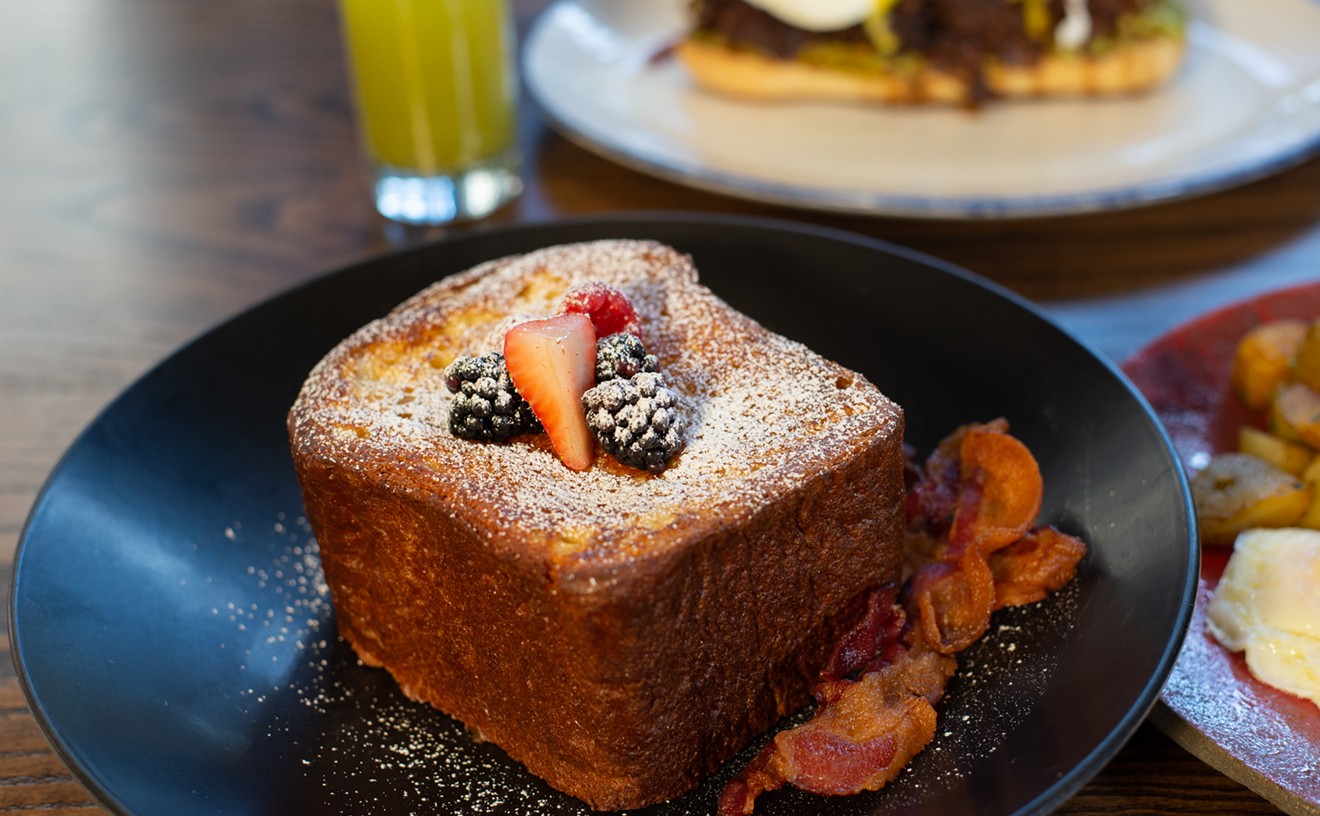Pay no attention to the nondescript signage that might just as easily advertise appliance sales or spray tans. Pera Turkish Kitchen, its name spelled out in plain, red letters on a white background, will set you at ease as soon as you walk through the double doors and enter the dim dining room decked out in nighttime maroon. There's a small bar, not meant for dining, and a few Turkish knickknacks hanging on the walls, but otherwise the space has changed very little since its last incarnation. Where Sushi Bar once sold noisy plates of glistening fish, Pera now peddles pide bread. Pide, not pita, but I'll get to that in a second.
Cast off your preconceived notions about ethnic dining offered deep in the suburbs, too. You don't have to endure a dingy storefront with seating lifted from a defunct fast-food restaurant to enjoy a meal laced with sumac and saffron. Far North Dallas' newest offering from the Middle East hits a sweet spot: at once casual and refined and very affordable.
You should come with more friends than fewer. Like most cuisines, Turkish dining is a social affair, but many of these dishes especially lend themselves to sharing, and you'll want access to as much of the menu as you can handle. Order the dolmas. They'll arrive coated with a sheen of olive oil, the shimmering, muddy green leaves bursting with rice, currants and other sweet things turned savory. Order the ezma, too, for a small plate that packs big flavors. The tiny dice of soft vegetables swims in a spicy sea of pomegranate and thick, black molasses. Don't forget the cacik, a savory yogurt with cucumbers, garlic and mint, and the Turkish shepherd salad loaded with tomatoes, pepper, cucumber and onion. It's dressed simply in olive oil and lemon with chopped parsley leaves strewn about for color and freshness.
Order all these things but don't touch. Wait till the small basket lined by a napkin the same color of the walls arrives and then dig in. The basket holds several rounds of freshly baked pide bread: Turkey's answer to the simple, rustic rounds that have fed Middle Easterners for millenniums.
Pera's breads are thicker than the pita loaves you're used to picking up at the grocery store. The soft, thick disks of bread are riddled with steaming holes and pockets that beg your fingertips to reach in and pull them apart. It's good enough to be enjoyed on its own, but the bread has a higher calling: a perfect utensil for plowing through the dips, condiments and salads that now cover your table. Tear off a little piece and use it like a pincer or rip a large hunk and use it like a bulldozer, but don't even think about picking up that fork sitting beside your plate. Enjoy this tactile banquet as much with your hands as your palate.
Habib Kargin is the chef responsible for the house-made loaves in a city that often fails to celebrate the craft of bread baking. It's simple bread, made out of little more than flour, olive oil, yeast, water and time. Kargin fires the loaves in the sort of deck oven usually used for making bad pizza elsewhere, one of the few changes owner Sam Sensel made to the kitchen after leasing the space on Preston Road.
Sensel, who has owned and operated Istanbul Grill in Arlington for the past three years, was ready to open a second restaurant. He'd come to Dallas after a stint in New York City soured him on high rent and ravenous competition. Dallas was affordable by comparison, and Turkish food was much harder to come by here, giving the restaurateur an edge. He called an old friend who'd whipped up hummus and tabouleh back in Manhattan and convinced him to come to Texas. Now Kargrin is cooking up some of Dallas' most interesting bread, and his other dishes are no less impressive.
Stick to the rustic, simple preparations to see this cook excel. Try lamb, chicken and beef kebabs, lamb chops and whole branzino, a European sea bass. (I told you to bring friends.) Sensel also installed a grill fired with charcoal for searing meat kebabs over a smoky flame. Kagrin does very little to these meats, letting his grill add more flavor than his simple marinades. The results taste fresh, almost exhilarating.
That branzino comes out whole, head, tail and all, but Yigit will quickly put you at ease. The waiter, known by Eddie to his customers, is yet another transplant from New York whom Sensel called on, and someone's taught him to debone a sea bass with the precision of a poissonnier. He'll ask if you'd like him to keep the head on your plate and you should— the most succulent meat is buried in the crevice tucked in front of the gills. Fish, even small ones, have delicious cheeks just like cows and pigs.
An Adana kebab wraps a spicy lamb sausage around a metal skewer and fires it over the same grill as the rest of the meats. This plate should grace your table as well; it's one of Pera's most flavorful.
A tough, oily falafel disappoints. Short ribs fail to elate. Hummus and tabouleh are no better than at most Middle Eastern restaurants. But on the whole, Pera's menu offers great flavor for the money. Finish your meal with a Turkish coffee. Eddie says the silty brew with sediment as thick as setting fudge will keep you up till 3 a.m. He's right, and I'm thankful. How else would I finish this story?










